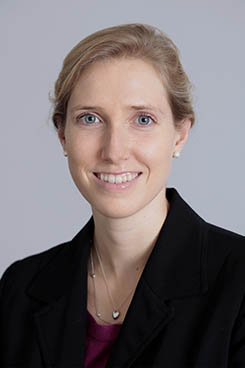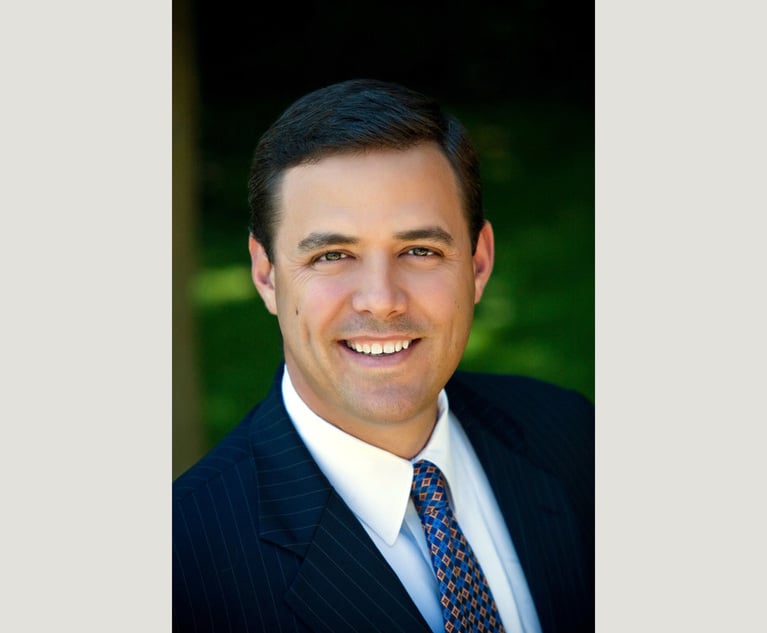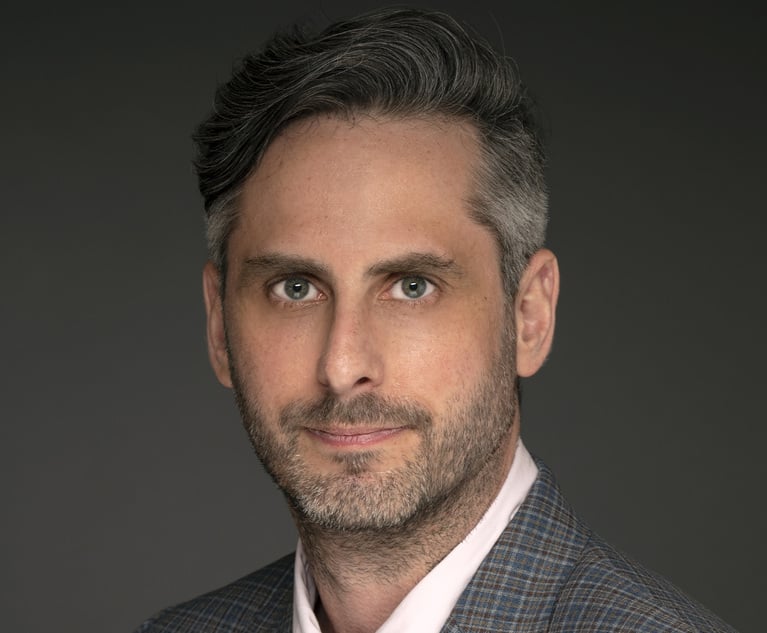Next Generation Women Leaders in Tech Law 2018: Julia Kropp, Farella Braun + Martel
Kropp says the best part of working in tech law is "stretching my brain, learning about new things all the time and working with really creative clients."
November 12, 2018 at 09:44 PM
4 minute read
 Julia Kropp, associate, Farella Braun + Martel (Courtesy photo)
Julia Kropp, associate, Farella Braun + Martel (Courtesy photo)
Julia Kropp, an associate at Farella, took an active role for BladeRoom Group in trade secrets and intellectual property litigation over the design and construction of a $200 million Facebook data center in Sweden. At trial, she conducted the examination of one of the most senior Facebook employee who testified.
Name an important opportunity you've had in your career and what you did with it?
I had the opportunity at trial to cross-examine a company branch director 20 years my senior, an individual from whom we needed to elicit a few discreet pieces of information key to damages and whose credibility was important to the jury relying on that information. Through my preparation and the experience of the cross-examination, I developed the understanding and the skill set to obtain the information I needed to get, maintain the witness's credibility and remain true to myself—I persisted in asking questions he had not quite answered; I impeached his testimony where necessary and re-crossed to correct misleading testimony opposing counsel elicited, all while remaining respectful and maintaining my own professionalism.
Who is the most important mentor you've had thus far in your career? Why?
As far as I can look back, I've really been graced with many great mentors who have given me their time and invested in me, whether it was a someone helping me navigate law school applications, advising me in law school or beyond. The lesson I've learned along the way was that, the more I engaged, the more the mentor gave me. As I've evolved in my career, my needs have changed and I've looked for and been fortunate to find many mentors at Farella, both partners and more senior associates, who model hard work and devotion to this job through their excellence and efficiency, balanced with time for family, friends and their own interests outside the law—their humanity.
What's the best part of working in the tech sector?
Stretching my brain, learning about new things all the time and working with really creative clients.
What's the biggest challenge?
Establishing trust with and earning respect from the client that I either already do or will come to understand and value the tech they are protecting as much as they want me to.
How do you describe what you do for a living to people you're meeting for the first time?
I help people protect the things they create.
What's one way technology has made your life easier?
The ability to check in remotely.
One way it's made your life more difficult?
The fact that none of us can hardly ever really be “unavailable” or fully offline.
What drew you to practicing law in the technology industry?
It's the dominant industry of the Bay Area and a sector that affords the opportunity to work with local clients big and small.
What's the best piece of career advice anyone ever gave you?
Never underestimate the importance of the people you work with—when you find good people, work hard to stick with them.
In 50 words or less, what's the best way to address tech's gender gap?
Don't spend years analyzing the numbers—acknowledge the gap, and do something, like start hiring more women.
Describe yourself in one word.
True to myself.
What kinds of new technologies should tomorrow's lawyers be able to use effectively?
Slack (or similar quick-contact platforms),
What's one area of technology that you're most excited about and why?
Gene therapies/any cancer-tracking and -defeating technology—because that is a truly meaningful technology that can change people's lives for the better, and because I wish it had been around when my dad was fighting the end of his cancer battle eight years ago.
This content has been archived. It is available through our partners, LexisNexis® and Bloomberg Law.
To view this content, please continue to their sites.
Not a Lexis Subscriber?
Subscribe Now
Not a Bloomberg Law Subscriber?
Subscribe Now
NOT FOR REPRINT
© 2025 ALM Global, LLC, All Rights Reserved. Request academic re-use from www.copyright.com. All other uses, submit a request to [email protected]. For more information visit Asset & Logo Licensing.
You Might Like
View All
How I Made Office Managing Partner: 'Stay Focused on Building Strong Relationships,' Says Joseph Yaffe of Skadden

US Patent Innovators Can Look to International Trade Commission Enforcement for Protection, IP Lawyers Say

How the Deal Got Done: Sidley Austin and NWSL Angel City Football Club/Iger

How Uncertainty in College Athletics Compensation Could Drive Lawsuits in 2025
Trending Stories
- 1SDNY Criminal Division Deputy Chief Returns to Debevoise
- 2Brownstein Adds Former Interior Secretary, Offering 'Strategic Counsel' During New Trump Term
- 3Tragedy on I-95: Florida Lawsuit Against Horizon Freight System Could Set New Precedent in Crash Cases
- 4Weil, Loading Up on More Regulatory Talent, Adds SEC Asset Management Co-Chief
- 5Big Banks Did Great Last Year. What Does That Mean for Big Law?
Who Got The Work
J. Brugh Lower of Gibbons has entered an appearance for industrial equipment supplier Devco Corporation in a pending trademark infringement lawsuit. The suit, accusing the defendant of selling knock-off Graco products, was filed Dec. 18 in New Jersey District Court by Rivkin Radler on behalf of Graco Inc. and Graco Minnesota. The case, assigned to U.S. District Judge Zahid N. Quraishi, is 3:24-cv-11294, Graco Inc. et al v. Devco Corporation.
Who Got The Work
Rebecca Maller-Stein and Kent A. Yalowitz of Arnold & Porter Kaye Scholer have entered their appearances for Hanaco Venture Capital and its executives, Lior Prosor and David Frankel, in a pending securities lawsuit. The action, filed on Dec. 24 in New York Southern District Court by Zell, Aron & Co. on behalf of Goldeneye Advisors, accuses the defendants of negligently and fraudulently managing the plaintiff's $1 million investment. The case, assigned to U.S. District Judge Vernon S. Broderick, is 1:24-cv-09918, Goldeneye Advisors, LLC v. Hanaco Venture Capital, Ltd. et al.
Who Got The Work
Attorneys from A&O Shearman has stepped in as defense counsel for Toronto-Dominion Bank and other defendants in a pending securities class action. The suit, filed Dec. 11 in New York Southern District Court by Bleichmar Fonti & Auld, accuses the defendants of concealing the bank's 'pervasive' deficiencies in regards to its compliance with the Bank Secrecy Act and the quality of its anti-money laundering controls. The case, assigned to U.S. District Judge Arun Subramanian, is 1:24-cv-09445, Gonzalez v. The Toronto-Dominion Bank et al.
Who Got The Work
Crown Castle International, a Pennsylvania company providing shared communications infrastructure, has turned to Luke D. Wolf of Gordon Rees Scully Mansukhani to fend off a pending breach-of-contract lawsuit. The court action, filed Nov. 25 in Michigan Eastern District Court by Hooper Hathaway PC on behalf of The Town Residences LLC, accuses Crown Castle of failing to transfer approximately $30,000 in utility payments from T-Mobile in breach of a roof-top lease and assignment agreement. The case, assigned to U.S. District Judge Susan K. Declercq, is 2:24-cv-13131, The Town Residences LLC v. T-Mobile US, Inc. et al.
Who Got The Work
Wilfred P. Coronato and Daniel M. Schwartz of McCarter & English have stepped in as defense counsel to Electrolux Home Products Inc. in a pending product liability lawsuit. The court action, filed Nov. 26 in New York Eastern District Court by Poulos Lopiccolo PC and Nagel Rice LLP on behalf of David Stern, alleges that the defendant's refrigerators’ drawers and shelving repeatedly break and fall apart within months after purchase. The case, assigned to U.S. District Judge Joan M. Azrack, is 2:24-cv-08204, Stern v. Electrolux Home Products, Inc.
Featured Firms
Law Offices of Gary Martin Hays & Associates, P.C.
(470) 294-1674
Law Offices of Mark E. Salomone
(857) 444-6468
Smith & Hassler
(713) 739-1250






